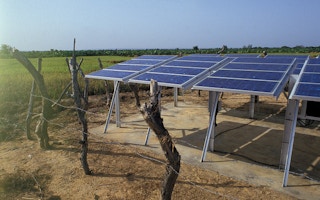Mkarima Tarimo, managing director of Tarimo Industries, a Tanzanian company producing ice cream, yoghurt and fruit juice for export to Europe, is a happy man.
Since January, the firm, based in the northern town of Arusha, has relied purely on solar power to drive its machines.
The result is a healthier profit margin due to savings on electricity bills, and an unbroken source of power in a country where frequent blackouts are a menace to manufacturing, schools, hospitals and homes.
“Solar is very reliable, considering consistent power blackouts,” Tarimo told the Thomson Reuters Foundation in his factory where solar panels line the roof.
“It has reduced electricity costs by a considerable amount. We are making more profits from returns as we have an alternative to conventional electricity.”
For example, last month’s electricity bill was about $1,000, almost a third of what it was in the previous month when Tarimo still relied partly on the national grid for power, he said.
“We also use solar in water heating and boiling during the food processing stages. Everything is solar here, including the refrigeration of our final food products. So use of solar is endless”, Tarimo said.
Through tax cuts and other support, Tanzania is trying to drive businesses - not just households - to take up solar power, with the aim of both improving energy access and cutting climate-changing emissions.
“
We are making more profits from returns as we have an alternative to conventional electricity.
Mkarima Tarimo, managing director, Tarimo Industries
Only around a quarter of Tanzanians have access to electricity, a problem the government is seeking to address through a push to exploit solar energy.
It aims to increase the East African country’s overall electricity connectivity to 50 per cent by 2025 and to at least 75 per cent by 2033, according to the World Bank.
Incentives
In January, Tanzania launched a joint initiative with the World Bank to curb carbon emissions by encouraging the increased use of solar power, especially among manufacturing companies, the country’s biggest carbon emitters.
Under the initiative, manufacturers can benefit from a 38 per cent reduction in value added tax (VAT) on solar panels.
“The initiative is a good idea and time will tell (if it is successful). It all depends on the consistency of solar use among the companies,” said Germano Mwabu, a World Bank consultant economist.
He said 33 out of the 344 manufacturing companies targeted by the initiative had switched to solar power.
“We negotiated with the Tanzania government to also provide loan installment services where one can pay monthly for solar panels,” Mwabu said, adding that solar panels can cost up to $10,000, including for installation.
He said the government, the World Bank and several companies were discussing the possibility of lowering VAT on solar panels even further in the coming months.
“If there is a way we can work out a solution with solar companies to have assembly plants locally, it can further reduce prices,” Mwabu added.
Green policies
In its national climate plan submitted last September, Tanzania, whose economy is heavily dependent on agriculture, said it had negligible emissions of greenhouse gases - total and per capita.
According to data on the Carbon Dioxide Information Analysis Center website, Tanzania is ranked 98 globally in terms of total carbon emissions - behind Sudan, Ghana, Kenya and Zimbabwe.
A market researcher, who has closely studied the Tanzanian market, said 18 companies had expressed an interest in going 100 per cent solar.
“Many countries are looking to go the solar way as part of corporate responsibility,” said Musa Mkapa, a consultant with Syagga Consultants with offices in Tanzania and Kenya.
“If you look at most fumes that go into the air from smoke emanating from factories, then you have to think twice.”
This story was published with permission from Thomson Reuters Foundation, the charitable arm of Thomson Reuters, that covers humanitarian news, women’s rights, trafficking, property rights and climate change. Visit http://news.trust.org to see more stories.










